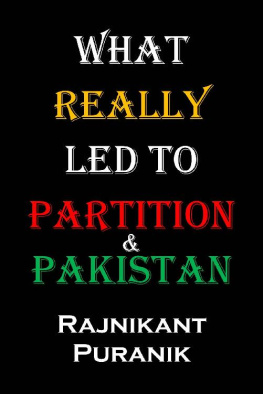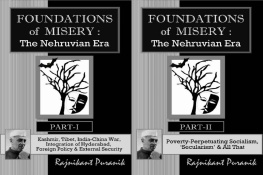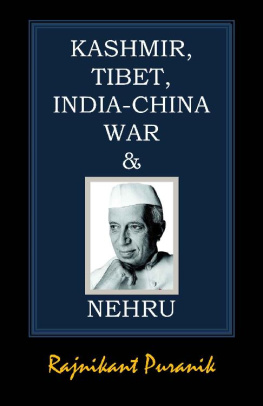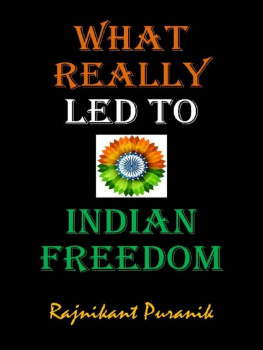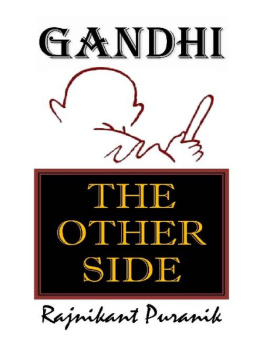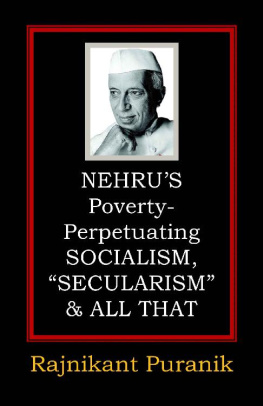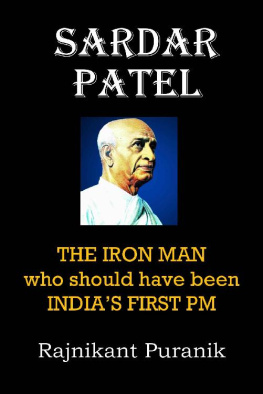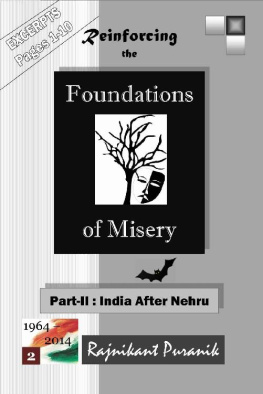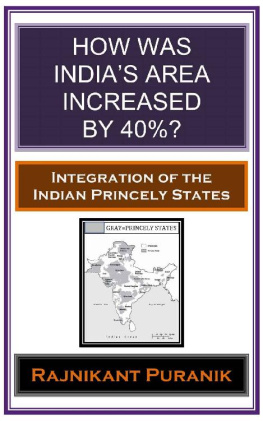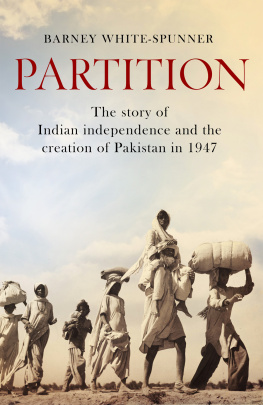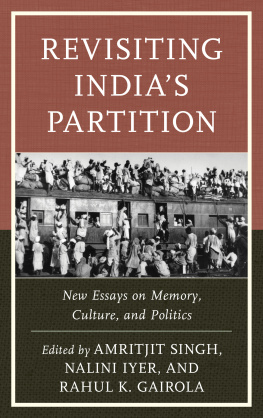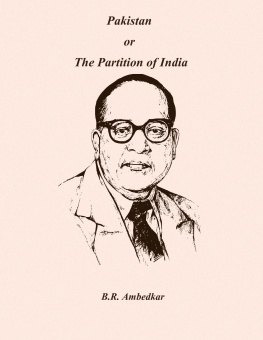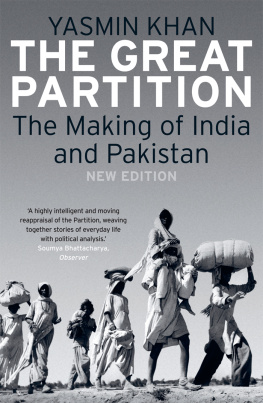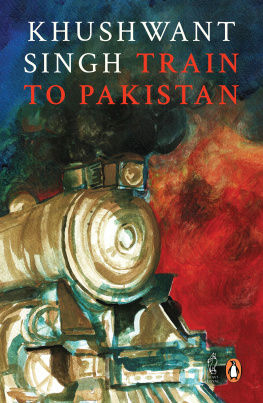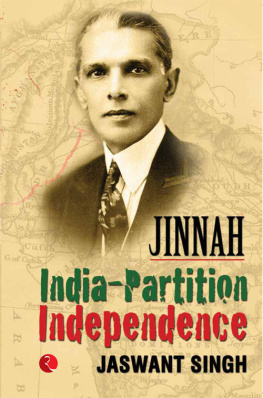Rajnikant Puranik - What Really Led to Partition & Pakistan
Here you can read online Rajnikant Puranik - What Really Led to Partition & Pakistan full text of the book (entire story) in english for free. Download pdf and epub, get meaning, cover and reviews about this ebook. year: 2018, genre: Politics. Description of the work, (preface) as well as reviews are available. Best literature library LitArk.com created for fans of good reading and offers a wide selection of genres:
Romance novel
Science fiction
Adventure
Detective
Science
History
Home and family
Prose
Art
Politics
Computer
Non-fiction
Religion
Business
Children
Humor
Choose a favorite category and find really read worthwhile books. Enjoy immersion in the world of imagination, feel the emotions of the characters or learn something new for yourself, make an fascinating discovery.
- Book:What Really Led to Partition & Pakistan
- Author:
- Genre:
- Year:2018
- Rating:5 / 5
- Favourites:Add to favourites
- Your mark:
- 100
- 1
- 2
- 3
- 4
- 5
What Really Led to Partition & Pakistan: summary, description and annotation
We offer to read an annotation, description, summary or preface (depends on what the author of the book "What Really Led to Partition & Pakistan" wrote himself). If you haven't found the necessary information about the book — write in the comments, we will try to find it.
What Really Led to Partition & Pakistan — read online for free the complete book (whole text) full work
Below is the text of the book, divided by pages. System saving the place of the last page read, allows you to conveniently read the book "What Really Led to Partition & Pakistan" online for free, without having to search again every time where you left off. Put a bookmark, and you can go to the page where you finished reading at any time.
Font size:
Interval:
Bookmark:
What Really |
Rajnikant Puranik |
What Really Led to
Partition & Pakistan
by
Rajnikant Puranik
Categories: Non-fiction, History
First Edition, August 2018
Copyright 2018 Rajnikant Puranik
Available on Amazon and Pothi.com
Please check
www.rkpbooks.com
for all the books by the author,
for their details, and from where to procure them
All rights reserved. No part of this publication may be reproduced, distributed or transmitted in any form or by any means, whether electronic/digital or print or mechanical/physical, or stored in an information storage or retrieval system, without the prior written permission of the copyright owner, that is, the author, except as permitted by law. However, extracts up to a total of 1,000 words may be quoted without seeking any permission, but with due acknowledgement of the source. For permission, please write to rkpuranik@gmail.com.
Preface
Divide et impera [Divide and Rule] was the old Roman motto, and it should be ours. {Akb/33}
Lord Elphinstone, the then Governor of Bombay.
We have maintained our power by playing off one against the other, and we must continue to do so Do what you can, therefore, to prevent all having a common feeling If all India was to unite against us, how long could we maintain ourselves? {Akb/33}
Sir Charles Wood, the then Secretary of State
No one with a close acquaintance with Indian affairs will be prepared to deny that on the whole there is a predominant bias in British officialdom in India in favour of the Muslim community, partly on ground of sympathy, but more largely as a makeweight against Hindu nationalism. {RPD/457}
Lord Oliver in 1926
I must send your excellency a line to say that a very, very big thing has happened today. A work of statesmanship [on the part of the British Raj] that will affect India and Indian history for many a long year. It is nothing less than pulling back of sixty-two millions of people (Muslims) from joining the ranks of the seditious opposition (Congress). {Akb/68}
Private Secretary J. Dunlop Smiths effusive message to Viceroy Minto upon formation of the Muslim League in 1906
God forbid, if the British rule disappears from India, Hindus will lord over it The only way for the Muslims to escape this danger is to help in the continuance of the British rule Let the Muslims consider themselves as a British army ready to shed their blood and sacrifice their lives for the British Crown. {Mak/117}
Waqar-ul-Mulk, Muslim Leagues first President,
addressing a student-gathering at Aligarh
I was present at the [foundational Muslim League] session [of 1906] and remember two reasons advanced for the establishment of the League... one of the objects of the League would be to strengthen and develop a feeling of loyalty to the British Government among the Muslims of India. The second object was to advance the claims of the Muslims against Hindus and other communities in respect of service under the crown and thus safeguard Muslim interests and rights. The leaders of the League were therefore naturally opposed to the demand for political independence raised by the Congress. They felt that if the Muslims joined in any such demand the British would not support their claims for special treatment in education and service {Azad/117}
Maulana Abul Kalam Azad in his autobiography.
The main thrust of the [Sir Olaf] Caroes argument was that the competition for oil would determine the future relationships of the powers and that the danger of attack of Soviet Russia was less likely in Europe than in the Middle East. Second, he argued that Pakistan, apart from having a strategic position in the region, was a Muslim country, and hence had a better chance of serving British interests in the Middle East than India ... {Pani/24-5}
DN Panigrahi, Jammu and Kashmir,
The Cold War and the West
The area of Pakistan [West Pakistan or the northwest of India] is strategically the most important in the continent of India and the majority of our strategic requirements would be met...by an agreement with Pakistan alone. {Sar/28}{DG/17}
A Report of the British Chiefs of Staff as quoted by Narendra Singh Sarila in The Shadow of the Great Game
The British military establishment too had become a strong proponent of Pakistan on account of its promise of cooperation in military matters.
Churchill favoured partition of India into Pakistan, Hindustan and Princestan [comprising Princely States]. {RG/343}
Am I a fool to accept this [offer at Shimla Conference 1946] , when I am offered Pakistan on a platter [by the British] ? {BK2/178}
Jinnah
Churchill played a key role in the creation of Pakistan [He] decided to give up India to the Indians after the war. Churchill and his colleagues decided, at the same time, to save what they could of the wreckage and it was this conviction that lay behind the offer to Jinnah of Pakistan on a platter. Pakistan was expected to give them a foothold in the sub-continent. {DD/255}
Durga Das
If Jinnah is regarded as the Father of Pakistan, then Churchill must be regarded as the Grand Father of Pakistan.
If Jinnah had refused to do what the British wanted, the British would have chosen another Muslim leader, and made a Jinnah of him.
Moreover, the Congress opposition to the war [WW-II] effort [plus Quit India Movement] and the League's de facto support for it convinced the British that the Hindus generally were their enemies and the Muslims their friends, and this consideration must have added force to the silent but effective official support for the policy of partition. {VPM2/438/L-8234}
VP Menon, The Transfer of Power in India
If the UK, the US, and the West had the assurance that the undivided India, after Independence, would serve as their ally, there would have been no Partition or the J&K imbroglio. Indian leaders lacked strategic thinking, else they would have reassured them of their co-operation, but after gaining independence, actually done what was in the best interest of India. What did India gain out of Nehrus socialism, non-alignment, and pro-Soviet tilt? Nothing. Indias economy went to dogs, our external security was compromised, and no one took India seriously in foreign affairs.
But the Indian leaders remained plagued by the Indians age-old weakness such as arrogance, inconsistency, often poor political judgement and disinterest in foreign affairs and questions of defence. {Sar/405}
Protected by British power for so long and then focused on a non-violent struggle, the Indian leaders were ill prepared, as independence dawned, to confront the power play in our predatory world. Their historic disinterest in other countries aims and motives made things none the easier. They had failed to see through the real British motivation for their support to the Pakistan scheme and take remedial measures {Sar/406}
By the end of 1946, they [Indian leaders] had been manoeuvred into such a corner that if Sardar Patel had not stepped forward to have a limb amputated, as he put it, and satisfy Britain, there was a danger of Indias fragmentation, as Britain searched for military bases in the bigger princely states by supporting their attempts to declare independence. {Sar/406}
Narendra Singh Sarila, The Shadow of the Great Game {Sar}
I also asked Lord Mountbatten to take into consideration the likely consequences of the partition of the country. Even without partition there were riots in Calcutta, Noakhali, Bihar, Bombay and Punjab If the country was divided in such an atmosphere there would be rivers of blood flowing in different parts of the country and the British would be responsible for such carnage Without a moments hesitation Lord Mountbatten replied, At least on this question I shall give you complete assurance. I shall see to it that there is no bloodshed or riot. I am a soldier, not a civilian. Once partition is accepted in principle, I shall issue orders to see that there are no communal disturbances If there should be slightest agitation, I shall adopt measures to nip the trouble in the bud I shall order the Army and the Air Force to act and use tanks and aeroplanes to suppress anybody who wants to create trouble. {Azad/207}
Font size:
Interval:
Bookmark:
Similar books «What Really Led to Partition & Pakistan»
Look at similar books to What Really Led to Partition & Pakistan. We have selected literature similar in name and meaning in the hope of providing readers with more options to find new, interesting, not yet read works.
Discussion, reviews of the book What Really Led to Partition & Pakistan and just readers' own opinions. Leave your comments, write what you think about the work, its meaning or the main characters. Specify what exactly you liked and what you didn't like, and why you think so.

